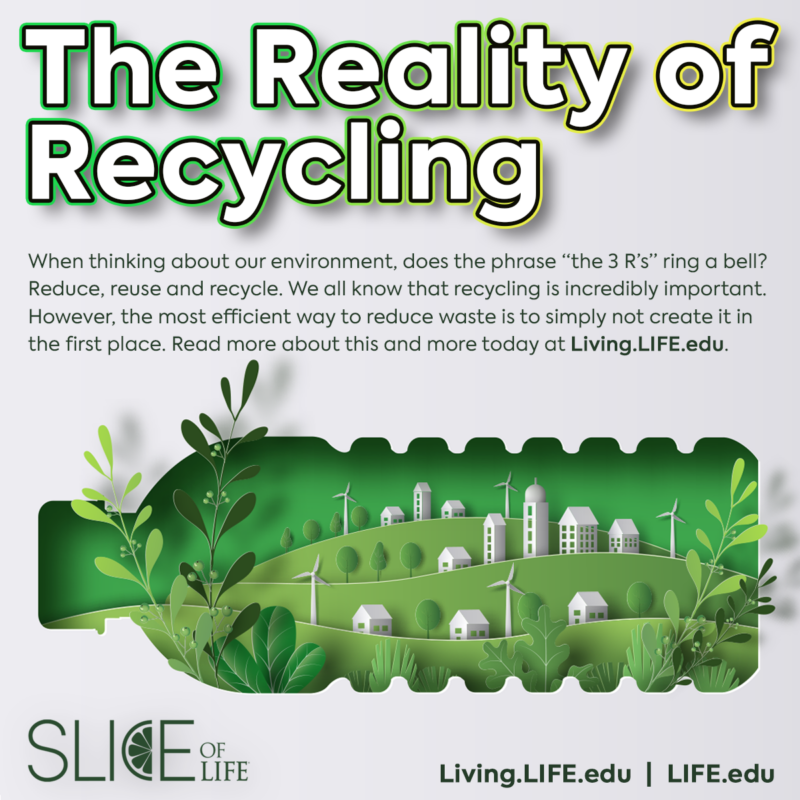Making significant lifestyle changes can often seem out of budget for most college students. However, the urgency to combat climate change means that each of us must play a role in living more sustainably. So, what does it mean to live sustainably? It’s about creating less waste and being mindful of our consumption habits. Here are some small, budget-friendly changes that college students can make to lead more eco-friendly lives. Here are ten ways a college student can live sustainably according to The Years Project.
- Recycle
Recycling is one of the simplest ways to contribute to fighting climate change. While it can be confusing to know what goes where, there are plenty of resources available to help you sort your recyclables correctly.
- Thrift Shopping
Did you know that 60% of all clothing made will be discarded within its first year? The fashion industry is a major polluter, second only to the oil industry. Thrift shopping is an affordable and sustainable alternative to buying new clothes. By shopping second-hand, you reduce waste and lower your carbon footprint.
- Meatless Mondays
If every American skipped one meal of chicken per week, it would be like taking over half a million cars off U.S. roads in terms of carbon dioxide emissions. Meatless Mondays are not only environmentally friendly but also cost-effective. Substituting meat with vegetables and grains can save an average family of four between $80-$100 a month.
- Cut Down on Plastic Use
Single-use plastics are a significant contributor to pollution. Switching to reusable water bottles and straws can make a big difference. Every year, millions of plastic straws and water bottles end up in landfills and oceans. By choosing reusable options, you help reduce this waste.
- Use a Reusable Coffee Cup
Globally, over four billion Starbucks coffee cups are used annually, most of which are not recyclable due to their plastic lining. Investing in a reusable coffee cup helps reduce this waste and is an easy step towards sustainability.
- Buy a Bamboo Toothbrush
Traditional plastic toothbrushes take 400 years to decompose. Bamboo toothbrushes are compostable and a simple switch that significantly cuts down on plastic waste.
- Recycled Material Notebooks
Forests play a crucial role in capturing greenhouse gases. By using notebooks made from recycled materials, you help save trees and reduce pollution. These notebooks are typically priced similarly to regular notebooks.
- Unplug Electronics
Electronics left plugged in all day contribute to unnecessary energy consumption. In 2018, electricity production accounted for 37% of all U.S. carbon dioxide emissions. Unplugging devices when not in use can help minimize your carbon footprint and save money on utility bills.
- Join a Campus Campaign
There are many ways to get involved in climate activism on campus. Organizations like ZeroHour and Extinction Rebellion have branches across the U.S., including on college campuses. Participating in these groups or local initiatives like divestment campaigns can help spread awareness and drive change.
- Vote
Voting for candidates with strong climate change policies is crucial in the fight against global warming. With millions of college students eligible to vote, your participation can make a significant impact.
According to United States Environmental Protection Agency, the United Nations recently reported that we have just 11 years to transition away from fossil fuels to prevent global temperatures from rising more than 1.5 degrees Celsius. Our collective efforts are essential to ensure a habitable planet for future generations.
Sustainability is not about making drastic changes overnight but about integrating small, meaningful actions into our daily lives. By adopting these habits, college students can lead the way in creating a more sustainable and eco-friendlier world.


Social Media